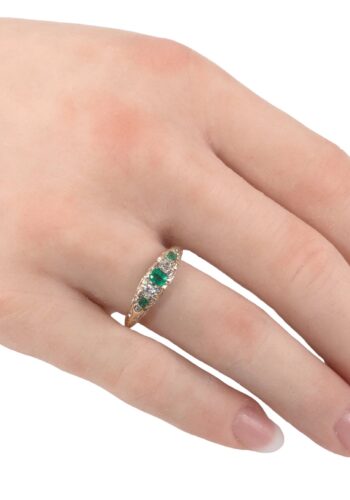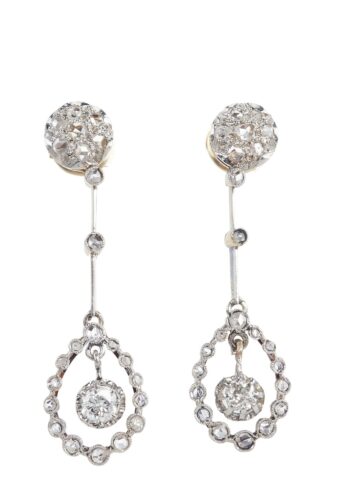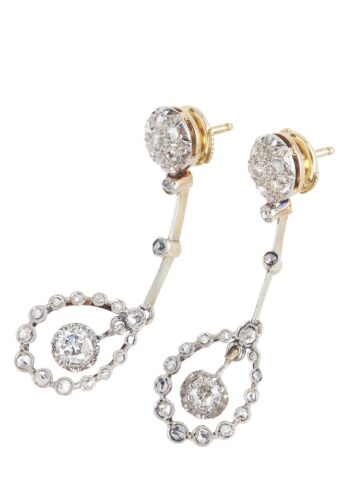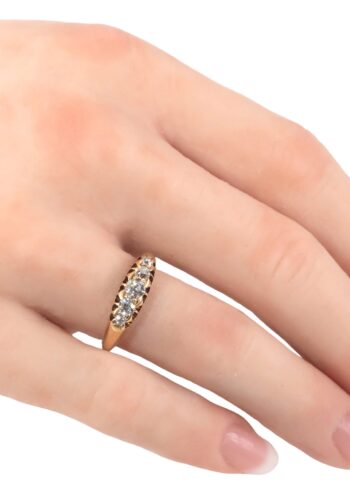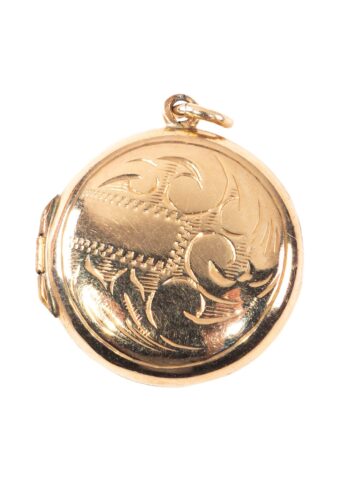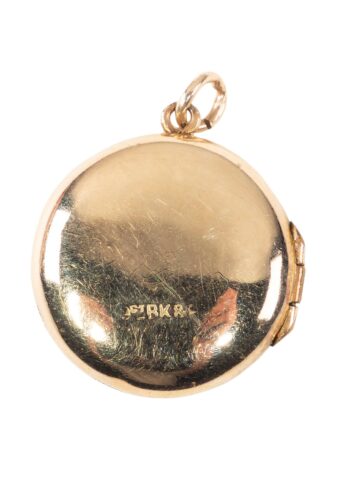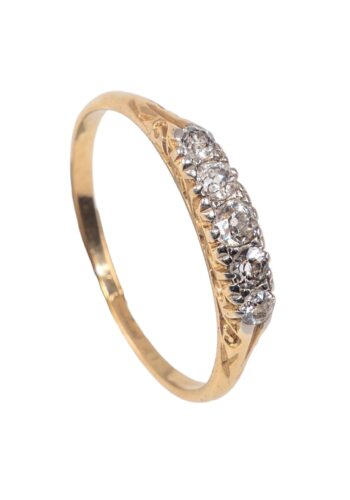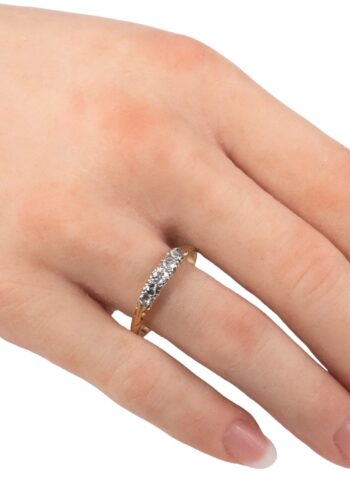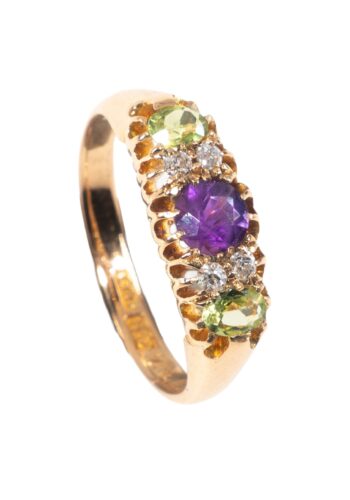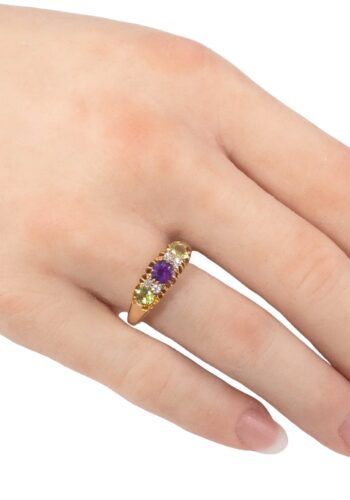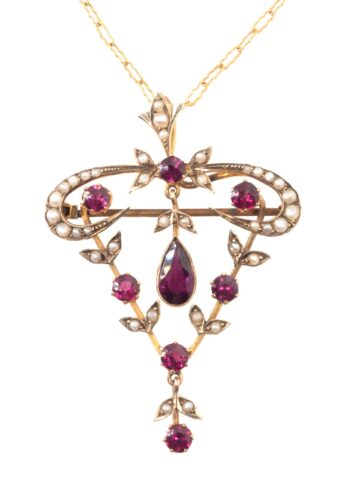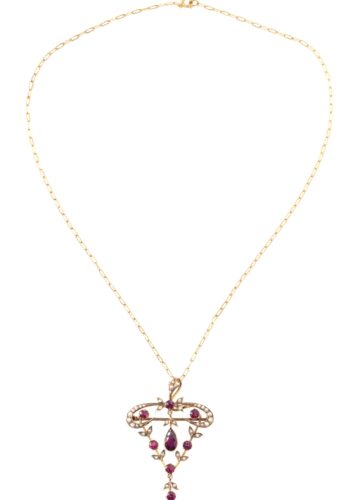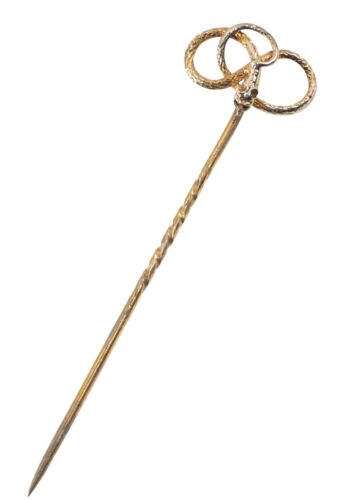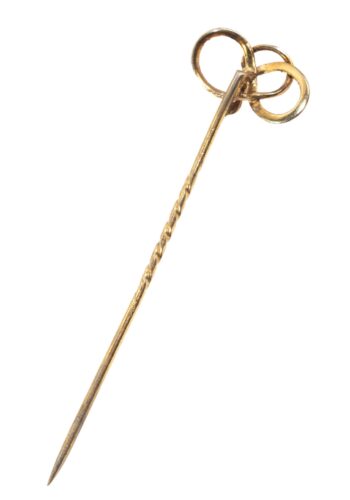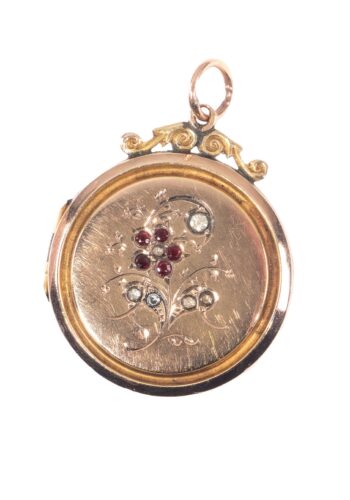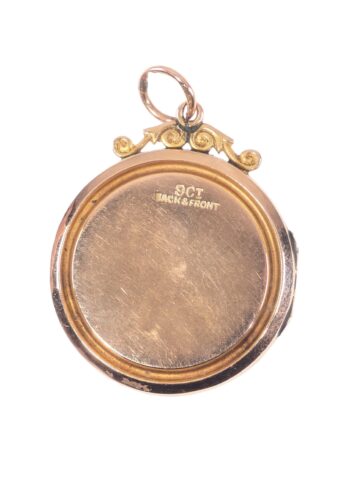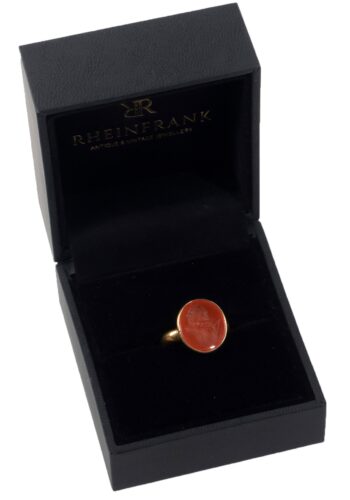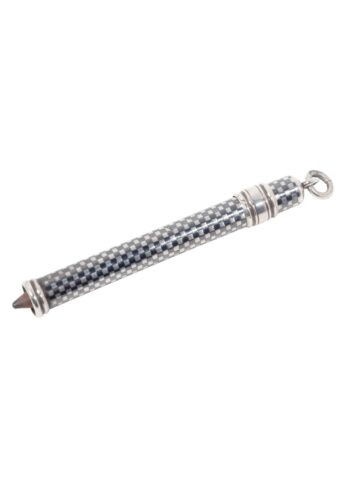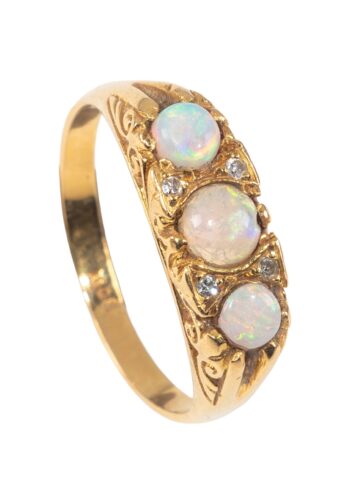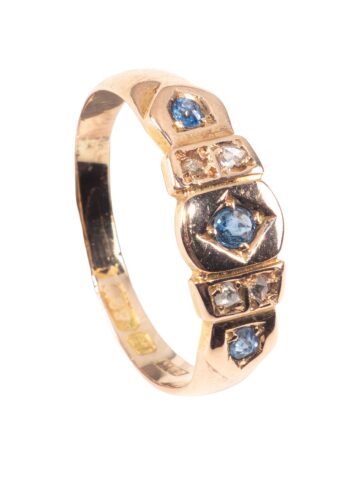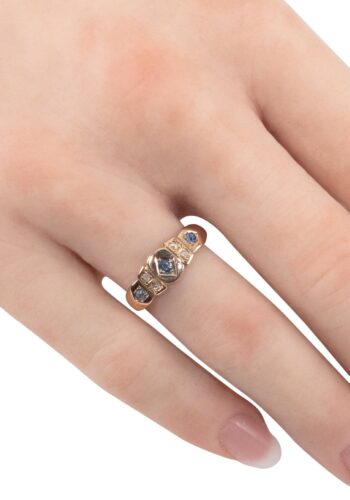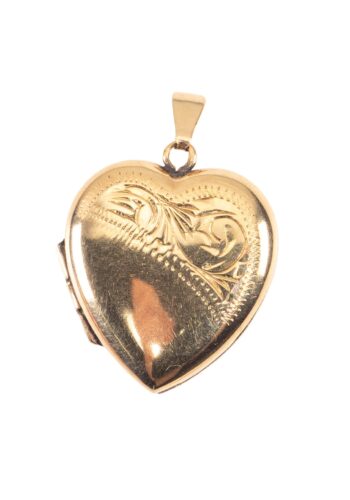
Edwardian - 1901 to 1914
This brief but sustained period of the British cultural history extended from the throne ascent of Eduard VII in 1901 after his death in 1910 up to the beginning of the 1st world war in 1914. Influentially until about 1920 this was an era of the limitless happiness on the one hand and the violent revolution and emancipation on the other hand. King Eduard had married one of the most beautiful and most civilised women: Alexandra of Denmark. The queen was from now on an icon of fashion and grace for the wide population.
Properly ritual she was revered by the people and the ladies imitated her way of dressing and decorating herself like a second skin. She was considered to be immortally beautiful and is therefore from today’s view for us historians absolutely ‚antique jewellery relevant‘. Thus Queen Alexandra is for the Edwardian maybe more important than the name father of this epoch himself. However, his influence on architecture was immensely important and is omnipresent in London still today, very impressively above all with the Admiralty Arch. One could adapt oneself at the house construction from now on, thanks to the raving progress of technology to the general access to electricity. The architects and developers did not have any more to think of hiding gas soot marks as a priority, but could express themselves in clear use of forms and brighter, friendly colours. Brighter and more friendly became the demanded materials in the jewellery production as well. From now on thanks to the newest procedures, in particular the invention of a new distiller in 1903, it was easier to process white precious metals like platinum and white gold (rhodium). In the Edwardian diamonds were popular as ever and were often combined with moonstones and pearls.
This combination is often to be found and probably belongs to the most timeless style means at all. Brilliants and pearls – expression of a high standard of living and the exceptionally good taste! Broken slope earrings from white precious metals combined with diamonds became also more popular and belong today to the testimonies in request of masterly jeweller’s craft art of the Edwardian. What else? As of 1903, the movement of the ‚Suffragettes‘ arose. Women went on the streets with full conviction and demonstrated for the right to vote and the strengthening of women’s rights. The motto ‚Give Women Vote‘ was expressed in an authentic style as a sign of supply and solidarity in form of jewellery. G stands for ‚Green‘ and is often symbolised by peridots. W stands for ‚White‘ and is presented with pearls and diamonds. V stands for ‚Violet‘ and finds mostly in the amethyst its perfect counterpart.
Click to fold
Properly ritual she was revered by the people and the ladies imitated her way of dressing and decorating herself like a second skin. She was considered to be immortally beautiful and is therefore from today’s view for us historians absolutely ‚antique jewellery relevant‘. Thus Queen Alexandra is for the Edwardian maybe more important than the name father of this epoch himself. However, his influence on architecture was immensely important and is omnipresent in London still today, very impressively above all with the Admiralty Arch. One could adapt oneself at the house construction from now on, thanks to the raving progress of technology to the general access to electricity. The architects and developers did not have any more to think of hiding gas soot marks as a priority, but could express themselves in clear use of forms and brighter, friendly colours. Brighter and more friendly became the demanded materials in the jewellery production as well. From now on thanks to the newest procedures, in particular the invention of a new distiller in 1903, it was easier to process white precious metals like platinum and white gold (rhodium). In the Edwardian diamonds were popular as ever and were often combined with moonstones and pearls.
This combination is often to be found and probably belongs to the most timeless style means at all. Brilliants and pearls – expression of a high standard of living and the exceptionally good taste! Broken slope earrings from white precious metals combined with diamonds became also more popular and belong today to the testimonies in request of masterly jeweller’s craft art of the Edwardian. What else? As of 1903, the movement of the ‚Suffragettes‘ arose. Women went on the streets with full conviction and demonstrated for the right to vote and the strengthening of women’s rights. The motto ‚Give Women Vote‘ was expressed in an authentic style as a sign of supply and solidarity in form of jewellery. G stands for ‚Green‘ and is often symbolised by peridots. W stands for ‚White‘ and is presented with pearls and diamonds. V stands for ‚Violet‘ and finds mostly in the amethyst its perfect counterpart.
Click to fold
-
Ca. 1910 – Edwardian ring with emeralds
€ 1.590,00
Differential tax applies collectors items and antiques in accordance with German law §25a UStGFree Shipping -
Ca. 1910 – Edwardian Diamond Earrings England
€ 2.900,00
Differential tax applies collectors items and antiques in accordance with German law §25a UStGFree Shipping -
Ca. 1910 – Edwardian pendant
€ 790,00
Differential tax applies collectors items and antiques in accordance with German law §25a UStGFree Shipping -
Dated 1915 – Edwardian ring with diamonds
€ 1.290,00
Differential tax applies collectors items and antiques in accordance with German law §25a UStGFree Shipping -
Ca. 1910 – Locket with hand engraving
€ 290,00
Differential tax applies collectors items and antiques in accordance with German law §25a UStGFree Shipping -
Ca. 1910 – Edwardian ring with diamonds
€ 1.390,00
Differential tax applies collectors items and antiques in accordance with German law §25a UStGFree Shipping -
Dated 1907 – Suffragettes ring
€ 1.690,00
Differential tax applies collectors items and antiques in accordance with German law §25a UStGFree Shipping -
Ca. 1910 – Edwardian ring with emerald
€ 1.190,00
Differential tax applies collectors items and antiques in accordance with German law §25a UStGFree Shipping -
Dated 1910 – Edwardian ring with peridots and diamonds
€ 1.490,00
Differential tax applies collectors items and antiques in accordance with German law §25a UStGFree Shipping -
Ca. 1900 – 15 ct. Gold Necklace with Tourmalines, Diamonds, Pearls & Enamel decorations, from Skinner & Co.
€ 8.500,00
Differential tax applies collectors items and antiques in accordance with German law §25a UStGFree Shipping -
Ca. 1910 – Edwardian pendant
€ 1.190,00
Differential tax applies collectors items and antiques in accordance with German law §25a UStGFree Shipping -
Ca. 1910 – Edwardian tie pin
€ 195,00
Differential tax applies collectors items and antiques in accordance with German law §25a UStGFree Shipping -
Dated 1928 – Men´s ring/signet ring with blood jasper
€ 890,00
Differential tax applies collectors items and antiques in accordance with German law §25a UStGFree Shipping -
Ca. 1910 – 15 Carat Gold Necklace with Sapphires, Ruby & Pearls
€ 1.990,00
Differential tax applies collectors items and antiques in accordance with German law §25a UStGFree Shipping -
Dated 1916 – Men´s ring/signet ring
€ 1.590,00
Differential tax applies collectors items and antiques in accordance with German law §25a UStGFree Shipping -
Ca. 1910 – Edwardian pendant
€ 790,00
Differential tax applies collectors items and antiques in accordance with German law §25a UStGFree Shipping -
Ca. 1910 – Edwardian bangle
€ 1.990,00
Differential tax applies collectors items and antiques in accordance with German law §25a UStGFree Shipping -
Ca. 1910 – Medallion
€ 490,00
Differential tax applies collectors items and antiques in accordance with German law §25a UStGFree Shipping -
Dated 1912 – Suffragette ring
€ 1.690,00
Differential tax applies collectors items and antiques in accordance with German law §25a UStGFree Shipping -
Ca. 1900 – Men´s ring/signet ring with Intaglio
€ 1.290,00
Differential tax applies collectors items and antiques in accordance with German law §25a UStGFree Shipping -
Ca. 1900 – Silver pencil with Niello decoration
€ 290,00
Differential tax applies collectors items and antiques in accordance with German law §25a UStGFree Shipping -
Ca. 1900 – Edwardian ring with opals and diamonds
€ 1.490,00
Differential tax applies collectors items and antiques in accordance with German law §25a UStGFree Shipping -
Ca. 1910 – Edwardian ring with sapphires and diamonds
€ 990,00
Differential tax applies collectors items and antiques in accordance with German law §25a UStGFree Shipping -
Ca. 1910 – Medallion
€ 390,00
Differential tax applies collectors items and antiques in accordance with German law §25a UStGFree Shipping





